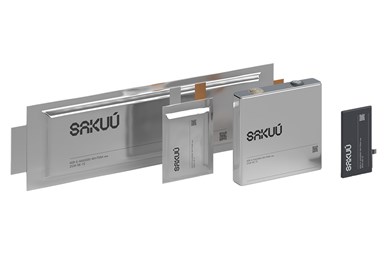Sakuu Develops Dry Kavian Process for Manufacturing Battery Electrodes
By printing batteries on Kavian, OEMs can tap into cleaner energy sources while eliminating the need for troublesome solvents and drying mechanisms.
Share
Read Next
Sakuu’s Kavian manufacturing platform offers a completely dry process for 3D printing battery electrodes which can deliver significant economic and environmental benefits. Early adopters are able to utilize the platform’s equipment, printable materials, electro-chemistry formulations and process technology to develop the next generation of batteries in a completely dry process.
The company has licensed its battery technology for producing lithium metal cells, providing an entirely dry electrode printing suite for anodes and cathodes. These building blocks are part of Sakuu’s strategic initiative to strengthen domestic production capabilities with localized sourcing and manufacturing.
By printing batteries on Kavian, OEMs can tap into cleaner energy sources while eliminating the need for troublesome solvents and drying mechanisms. Utilizing this platform with dry-process technologies eliminates all toxic solvents and materials, including NMP and PTFEs. It is also designed to cut factory floor space requirements up to 33%, reduce utility costs up to 40% and improve factory carbon footprints up to 40%.
The company says that electrodes printed by Kavian have been proven to achieve equivalent or better performance than today’s 30-year optimized processes with the added opportunity to customize battery cell chemistry, features and design. The platform can fit seamlessly into today’s manufacturing lines, affording flexibility for customers to adapt and evolve.
The system is engineered to be material agnostic, supporting each manufacturer’s unique specifications, performance, and form factor needs, enabling OEMs to customize component dimensions and thickness from five to 200 microns.
“After seven years of intense research and development, Sakuu has solved fundamental issues plaguing the battery industry,” says Robert Bagheri, Sakuu founder and CEO. “Printing batteries, without solvents, finally gives manufacturers a chance to change how and where this critical industry can thrive. The foundational building block approach to the Kavian platform is the key to unleashing innovation for next-generation batteries, including solid state. Sakuu is thrilled to offer early access to joint development partners.”
With Kavian, Sakuu is aiming to transform the economics of battery manufacturing equipment and cell production, and level the playing field for localization. Currently, 60% of the world’s battery cells are manufactured in China, using coal as the primary energy source and toxic slurries to coat electrodes.
The Kavian platform is now available for go-to-market development opportunities, with expanded availability in late 2024.
- Read about the opening of Sakuu’s Silicon Valley Engineering Hub. The engineering hub was designed to advance the company’s domestic battery printing initiatives and serve as a gateway for at-scale battery printing gigafactories globally.
- Learn about Sakuu’s multimaterial 3D printing which enables production of solid state batteries. By combining different 3D printing processes and materials in a single layer, Sakuu’s Kavian platform can produce batteries for electric vehicles and other applications with twice the energy density and greater safety than traditional lithium-ion solutions.
Related Content
-
Alquist 3D Looks Toward a Carbon-Sequestering Future with 3D Printed Infrastructure
The Colorado startup aims to reduce the carbon footprint of new buildings, homes and city infrastructure with robotic 3D printing and a specialized geopolymer material.
-
Video: AM for Harder, Longer-Lasting Brake Discs
Additive manufacturing is being applied to limit automotive brake dust. For a major automaker, Etxetar and Talens are developing a production-speed directed energy deposition system to give brake discs a precise layer of wear-resistant carbide.
-
Video: AM for Repair of Large Shafts
Wind power shafts that might once have been scrapped are now returned to service. See the robotic directed energy deposition (DED) and shaft preheating system developed by Ikergune, Izadi and Talens.















